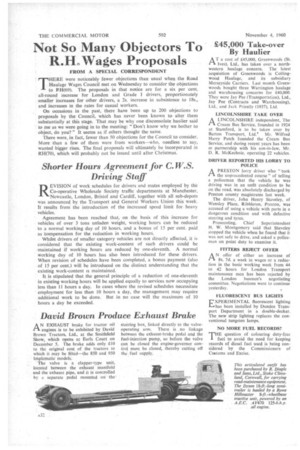Not So Many Objectors To R.1-10 Wages Proposals
Page 34

If you've noticed an error in this article please click here to report it so we can fix it.
FROM A SPECIAL CORRESPONDENT
THERE were noticeably fewer objections than usual when the Road Haulage Wages Council met on Wednesday to consider the objections to RH(69). The proposals in that notice are for a six per cent. all-round increase for London and Grade I drivers, proportionately smaller increases for other drivers, a 2s. increase in subsistence to 18s.,
and increases in the rates for casual workers. .
On occasions in the past, there have been up to 200 objections to proposals by the Council, which has never been known to alter them substantially at this stage. That may be why one disconsolate haulier said to me as we were going in to the meeting: "Don't know why we bother to object, do you?" It seems as if others thought the same.
There were, in fact, fewer than 50 objections for the Council to consider. More than a few of them were from workers—who, needless to say, wanted bigger rises. The final proposals will ultimately be incorporated in RH(70), which will probably not be issued until after Christmas.
Shorter Hours Agreement for G W.S. Driving Staff
REVISION of work schedules for drivers and mates employed by the Co-operative Wholesale Society traffic departments at Manchester, Newcastle, London, Bristol and Cardiff, together with all sub-depots was announced by the Transport and General Workers Union this week. It results from the introduction of the increased speed limit for heavy vehicles.
Agreement has been reached that, on the basis of this increase for vehicles of over 3 tons unladen weight, working hours can be reduced to a normal working day of 10 hours, and a bonus of 15 per cent, paid, as 'compensation for the reduction in working hours.
Whilst drivers of smaller category vehicles are not directly affected, it is considered that the existing work-content of such drivers could be maintained if working hours are reduced by one-eleventh. A normal working day of 10 hours has also been introduced for these drivers. When revision of schedules have been completed, a bonus payment (also of 15 per cent.) will be introduced on the distinct understanding that the existing work-content is maintained.
It is stipulated that the general principle of a reduction of one-eleventh in existing working hours will be applied equally to services now occupying less than 11 hours a day. In cases where the revised schedules necessitate employment for less than 10 hours a day, the management may require additional work to be done. But in no case will the maximum of 10 hours a day be exceeded.
David Brown Produce Exhaust Brake
A N EXHAUST brake for tractor oil 1-1 engines is to be exhibited by David Brown Tractors, Ltd., at the Smithfield Show, which opens at Earls Court on December 5. The brake adds only €10 to the original cost of the tractors to which it may be fitted—the 850 and 950 Implernatic models.
The valve is a clapper-type unit, located between the exhaust manifold and the 'exhaust pipe, and it is controlled by a separate pedal mounted on the steering box, linked directly to the valveoperating arm. There is no linkage between the exhaust-brake pedal and the fuel-injection pump, so before the valve can be closed the engine-governor control must be closed, thereby cutting off the fuel supply.
























































































































